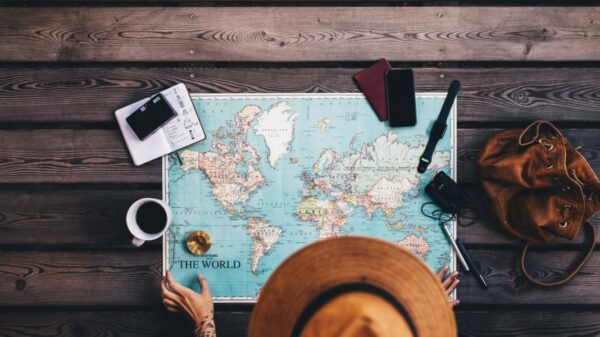 Do you have the courage to stay off the Internet for just one day – a mere 24-hours? If so, you’ll be joining one of the most important websites and voices on the World Wide Web.
Do you have the courage to stay off the Internet for just one day – a mere 24-hours? If so, you’ll be joining one of the most important websites and voices on the World Wide Web.
Jimmy Wales, founder of Wikipedia, the world’s encyclopedia, announced that on Wednesday, January 18, 2012 Wikipedia will “go dark” in protest over two internet censorship bills currently in US House and Senate.
Starting at midnight on the 18th, the English-language version of Wikipedia will be offline in protest of the Stop Online Piracy Act (SOPA) and PROTECT IP Act (PIPA). These bills, currently being debated in both the US Senate and Congress, take aim at websites offering pirated content, and any services and products that aid these efforts.
These two bills propose not only to make these types of websites unavailable through traditional search engines, but also removed from Domain Naming System (DNS) servers.
Removing these websites from search engines won’t affect a person’s ability to type in the name of the website, or to use established bookmarks in their browsers. However, removal from DNS servers, which are how website names are actually resolved and found, would prevent access to these websites.
Wales, in an effort to send a serious and resounding message to the US government, has indicated that internet users who attempt to use Wikipedia on the 18th will, instead, hit a “landing” page that essentially states that the Internet must remain free.
Mounting pressure from other internet companies has already affected some change in Washington D.C. A handful of SOPA’s supporters, including SOPA sponsor, Congressman Lamar Smith (R-TX), has indicated he will be pulling the DNS-removal language from the bill.
Over in the Senate, at least six senators currently serving on the Senate Judiciary Committee have sent a letter to Senate Majority Leader Harry Reid (D-NV) to postpone any votes on PIPA.
Additionally, Victoria Espinel, Intellectual Property Enforcement Coordinator at Office of Management and Budget, Aneesh Chopra, U.S. Chief Technology Officer, and Howard Schmidt, Special Assistant to the President and Cybersecurity Coordinator for National Security Staff wrote on the official White House blog:
“While we believe that online piracy by foreign websites is a serious problem that requires a serious legislative response, we will not support legislation that reduces freedom of expression, increases cybersecurity risk, or undermines the dynamic, innovative global Internet.”
The pressure is clearly mounting on federal lawmakers to think twice about what they’re doing, and when heavyweights like Jimmy Wales and his creation Wikipedia jump directly into the deep end, the waves are bound to get onlookers more than a little wet.
To view the debates and discussions that have ensued since at least October of 2011, and to see the many ways that SOPA and PIPA will hurt content providers, click here.
Won’t you join Wales, Wikipedia, and hundreds of other websites on Wednesday, January 18, 2012 and “go dark” for a day? It could very well be a liberating personal experience, and should send the final, crushing blow needed to put an end to SOPA and PIPA.
About the Author: When he’s not out skiing the Utah powder, Greg Buckskin is a writer and blogger for CableTV.com. Home to Comcast Cable Deals

35 Comments
Leave a Reply
Cancel reply
Leave a Reply
This site uses Akismet to reduce spam. Learn how your comment data is processed.

























































































































































































Tracyann0312
January 19, 2012 at 4:16 am
That was really bad, do the government think how many people will lost their jobs if the censorship appears online? We must fight for our right as Internet marketers. if they will just make this legal, the they will be able to benefit more from it!
Danny
January 19, 2012 at 6:53 am
“Won’t you join Wales, Wikipedia, and hundreds of other websites on Wednesday, January 18, 2012 and “go dark” for a day?”
“Posted by Greg Buckskin on January 18, 2012”
Haha, you didn’t want to? and it’s a bit too late to join.
I think it is absurd that these bills even get discussed. But it’s like the media companies are like a smaller version of the oild companies and the bill is their version of the wars for oil.
There are many ways to deal with piracy, and they pick the least gracious way which will blow up in their faces.
Renny
January 19, 2012 at 10:38 am
By blacking out for 24 hours, big names like Wikipedia, Google, etc.. have shown government the strength among the internet marketers. By imposing such act internet market is surely going to suffer. This indirectly will affect the national economy. Just imagine the whole internet market will go down! Even social networking sites will no longer exist. Today more than half of the population is on Facebook and almost all the businesses uses these sites for network marketing. This was the good way to protest against all this.
Gab
January 19, 2012 at 4:04 pm
I hope that the blackout caused an impact to the ongoing fight against SOPA and PIPA. Once these bills get approved, I can’t imagine how we are going to use the internet…
Domenic Giorgio
January 20, 2012 at 8:06 am
The US government really needs to understand that they cannot control everything they see or they hear about. No one owns the internet and it belongs to the people. If websites are providing information for free, then they should be appreciated for that and not censored.
Jeo
January 21, 2012 at 4:00 am
I have nothing particularly insightful or original to add in the case against Internet censorship represented by the bills up before congress, SOPA and PIPA, but not to say something today would be too miserable an omission to live with. So when I found in my e-mail this morning about people blacking out their sites, I did not hesitate to do the same on mine.
Ableak
January 23, 2012 at 8:55 am
Its absolutely senseless to censor the internet. Internet belongs to no one and no one has any rights to decide which content should be censored. People should decide for themselves according to their needs about what they want and what not. Major steps will have to be taken to stop this US government take over everything.
Catrien
January 24, 2012 at 6:09 am
Every few years, the internet has to deal with a greedy politician or corporation trying to censor it, in the hope of obtaining more money. Now it’s that time again. Some guys are begging for the internet to be policed, with a new bill called SOPA. Many users are worried because several countries are showing signs of accepting it. I doubt it will pass, but it’s never the less important for everyone who is against this to oppose that movement. It’s a very dangerous initiative, that can even allow bringing websites down for very interpretable reasons.
Collins
January 25, 2012 at 4:15 am
SOPA and PIPA have only been delayed and not stopped. The fight to protect internet freedom is not over yet. These bills, If passed, could be devastating to small online entrepreneurs like ourselves. I highly encourage you to contact your political representatives no matter where they are in the world and voice your opposition to these bills. Even though they are US bills they have a worldwide effect and could be used as precedents in countries around the world.
Jack
January 27, 2012 at 10:03 am
As stated above, there is always to by pass a restriction. Should this bill go through, i foresee a resurgence in the uses of modes and the bulletin boards that were in uses prior to the internet. Just imagine the effort it would take to control person to person data exchanges that are not transported on a network.
David
January 31, 2012 at 5:40 am
It’s hard to make a complete argument for or against it since its hard to predict the consequences. I don’t really think they need to pass a bill for it though. Most of the countries that do pirate will probably still not care about our law and I am sure pirators will still figure out a way to close and open another business in minutes. So most likely more tax dollars will be spent trying to fight the unfightable. Personally, I don’t think the bill will help but cost more money and issues for the US in the end.
Erica
January 31, 2012 at 5:25 pm
One thing I don’t understand is how SOPA/PIPA were said not to be passed but then at the same time Megaupload was shut down. Doesn’t that mean they already have the power to close down any site? Or did they take it down because of money laundering? If the reason was copyright infringement, it seems to me like SOPA is already in action! Or what am I missing here?
Greg Buckskin
January 31, 2012 at 11:17 pm
I think the biggest difference is that PIPA/ SOPA give the power to take down offending website directly to the copyright holding companies–and it gives them the power to take those sites down without going through the government…
James
February 2, 2012 at 9:35 am
As stated above, there is always to by pass a restriction. Should this bill go through, i foresee a resurgence in the uses of modes and the bulletin boards that were in uses prior to the internet. Just imagine the effort it would take to control person to person data exchanges that are not transported on a network. This is just another corporate/government attempt at keeping us apart as a global citizenry and away from knowledge and information.
Shiliang
February 6, 2012 at 6:00 am
Even though the bill does not have to do with foreign countries, it does have to do with protecting pirated content, which is mostly pirated by foreign countries such as China and Russia and available in the US. These days we live in a global economy and not individual countries, its all connected. With information being accessible so easily, it makes it easy for foreign countries to penetrate the US and make fakes and pirated content easily available. Putting restrictions on US companies/sites will just add fear and will limit peoples freedom for content sharing, however I don’t expect it to slow down pirated content or China fakes. People who want things for free or cheap, will figure out how to get it.
Jack
February 7, 2012 at 8:02 am
Although we may think that internet censorship and government spying are things only found in places such as North Korea or within the pages of 1984, it is much more real than we could have ever imagined. The government has teamed up with sites such as Google, Yahoo, and even Facebook to gather information on every single person and censor information they deem unfit for us to know. As well as all that the government has even teemed up with Mark Zuckerberg to gather information on every person with a facebook that can be accessed and manipulated at any given moment by the government! We need to take a stand and let our government know that we are done with the their hidden agendas and misuse of our social networks and search engines.
Joseph
February 10, 2012 at 4:08 am
There’s a reason that several DOZEN human rights groups have come out against it. There’s a reason that literally hundreds of law professors signed a petition to stop it. There’s a reason Google, Wikipedia, some of the biggest online companies are protesting this. Please, do some research on why there is such opposition to this before you write it off.
Dixia Shi
February 10, 2012 at 4:43 am
What exactly are they CENSORING? They are enforcing copyright laws, no CENSORSHIP involved. You know what… I was about to type up some big explanation and then I realized that people who just mindlessly take a position on issues with no knowledge of any of the details are a huge part of the problem with the world in general. If you really want to know, go read up on what the law would actually do. Don’t just assume that the name of the bill is a totally accurate representation of what it does. Put a little effort into making intelligent choices.
Thomas
February 11, 2012 at 6:02 am
Speaking of exciting developments, it appears that the Stop Online Piracy Act(SOPA) is dead, at least for now. I think the Obama administration’s lack of enthusiasm for the bill is important, but I suspect that a crowded legislative calendar is also playing a significant role. Of course, the PROTECT IP Act is still floating around the Senate. It’s less worse than SOPA, in the same way that Transformers 2 is less worse than Transformers 3. I am not opposed to Internet censorship in all situations, which means I am often lonely at tech-related events. But these bills have significant flaws.
Joe
February 13, 2012 at 8:50 pm
By passing a bill like this they are trying to put limitations on people\\\’s rights and freedoms. No one owns the internet and therefore no one truly has the right to say what people can and cannot do on it. Now on the other side there are things that do need to be monitored such as copyright laws and such, but I do not believe that the way to enforce laws like this is to take it to this level and try to censor all of the internet.
Janet
February 14, 2012 at 3:06 am
Censorship is generally an evil and should be avoided where ever possible. Child pornography is an extreme example and there is already sufficient legislation to deal with those who attempt to produce, distribute or view such material. Other forms of speech may well be truly offensive but the only way a society can deal with them is by being exposed to them and combating them. Otherwise these groups are driven underground and become martyrs.
Ayush Agrawal
February 14, 2012 at 3:36 am
These bills will threaten every single website’s freedom online. Even Google may be punished for including links to pirated software in their results.
That was a good move by wikipedia because these guys need to know that we own our freedom!
Jeo
February 15, 2012 at 10:01 am
Despite the generally prevailing principle of freedom of speech in democratic countries, it is widely accepted that certain types of speech are not given protection as they are deemed to be of insufficient value compared to the harm, they cause. Child pornography in the print or broadcast media for instance is never tolerated. The internet should be no exception to these basic standards. Truly offensive material such as hardcore pornography and extreme racial hatred are no different simply because they are published on the world wide web as opposed to a book or video.
joe262
February 16, 2012 at 7:34 pm
I can see both sides of this. Remember napster they had to change because they made money fom giving music they did no own out for free. If it is a actual product or service they should enforce the law. If it is just information than no.
David
February 21, 2012 at 8:55 am
I think it’s important that companies do not give in to demands of censorship from regimes. It goes against the foundation of what the Internet is free access to information. The counter argument runs that offering people access to some information, albeit restricted, is better than offering them no information at all.
Edward
February 21, 2012 at 9:23 am
The internet censorship should be allowed in certain extent, such as child pornography, violence, and the abuse of others human rights. However, because the standard for “the freedom of speech” is vague, many people misunderstand its true meaning and abuse the rights of the others. The limitation itself is not a problem, but too much limitation could lead to controversy.
Kathy Blackmore
April 19, 2012 at 7:48 am
I think many people are outraged by the regulations, despite it being for the greater good in its lofty aspirations. I personally do not support the PIPA and similar acts, because freedom of speech in today’s society is precisely what propels the human race forward, and to restrict that is the equivalent of burning books like they did in medieval times.
Felicia Corrine
May 4, 2012 at 1:08 pm
If the censorship is introduced then the users will use their freedom. The Internet will become vague with a lot of restrictions. I stand with the Wikipedia in their agitation. They have done a good work.
Gsb
June 3, 2012 at 10:20 pm
I wonder how long it’s going to be before Wikipedia is sold to Google? The internet will soon be owned body and soul by the corporate giants.
Layla Davis
June 4, 2012 at 6:20 pm
Even though I am 100% against any kind of censorship I gotta say I “understand” that piracy website are getting blacklisted, I am not saying I like it but I understand it.
I think there are many worse examples of censorship on internet nowadays…
I know google is a bit scary for many people but I think they forget how much google brought to the internet…
Prestiti
July 13, 2012 at 11:57 pm
Yesterday in Russia: Websites that breach the law would have 24 hours to remove offensive material or face blacklisting. Internet service providers will also have to cooperate in blacklisting sites or they risk being blacklisted themselves.
Joseph Admin2
July 14, 2012 at 12:48 pm
That’s just so unbelievable. Is it actually law or still a proposal?
Greg Buckskin
July 16, 2012 at 4:45 pm
That is some scary stuff! Next thing you know goons in hoods with guns will be kicking your doors in for clicking on the typical reddit link… Keep informed and keep spreading the word!
Chris
September 4, 2012 at 3:09 am
Does anyone know what’s happened with this? Can we get an update? As an internet marketer this kind of information and discussion has serious implications
ayman
October 14, 2012 at 12:07 pm
yes i have courage to stay off the Internet 24 hours but i will be another human